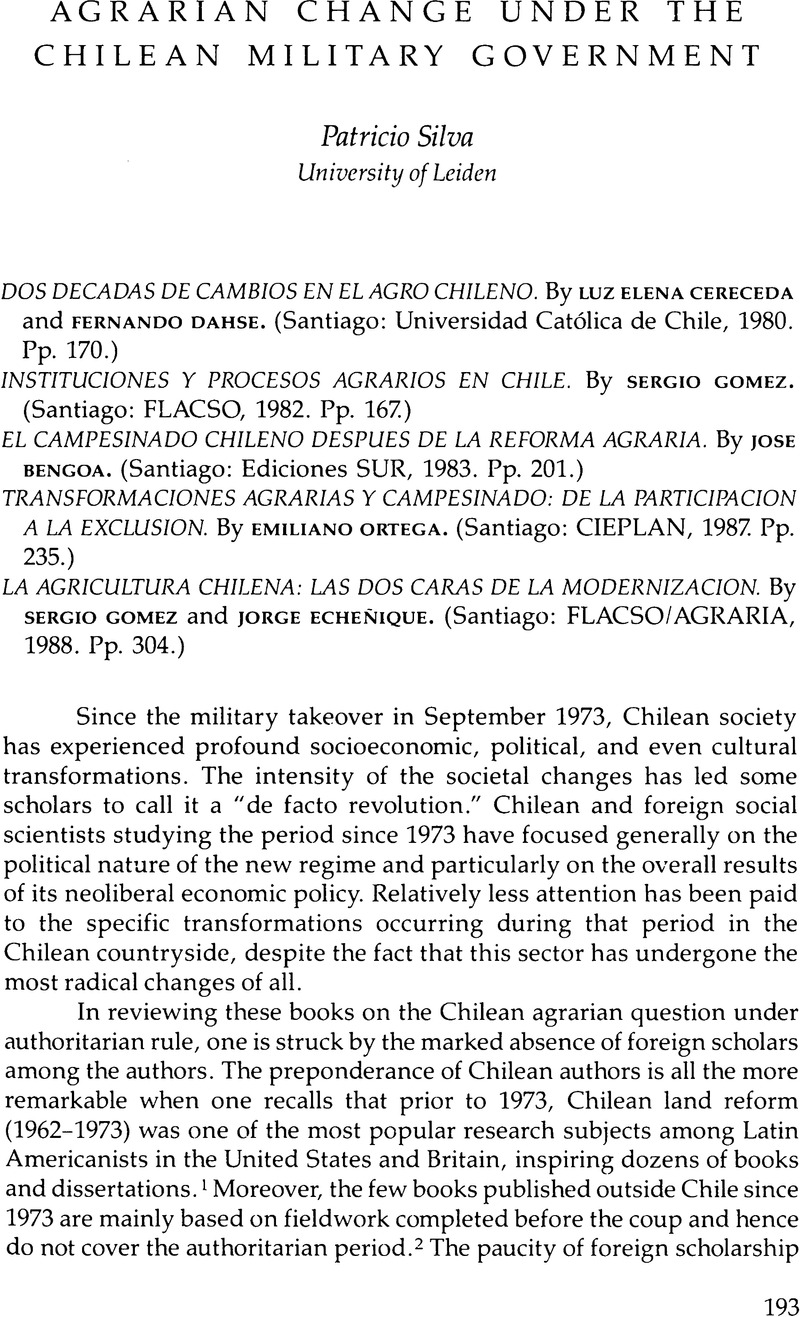Published online by Cambridge University Press: 12 October 2022

1. Among the most influential studies are M. J. Sternberg, Chilean Land Tenure and Land Reform (Berkeley and Los Angeles: University of California Press, 1962); William Thiesenhusen, Chile's Experiments in Agrarian Reform (Madison: University of Wisconsin Press, 1965); H. Landsberger and F. Canitrot, Iglesia, intelectuales y campesinos (Santiago: Editorial del Pacifico, 1967); Solon Barraclough et al., Reforma agraria chilena: seis ensayos de interpretación (Santiago: Instituto de Capitación e Investigación en Reforma Agraria, 1970); P. Crosson, Agricultural Development and Productivity: Lessons from the Chilean Experience (Baltimore, Md.: Johns Hopkins University Press, 1970); David Lehmann, “La agricultura chilena y el período de transición,” Sociedad y Desarrollo 3 (July-Sept. 1972): 101–44; Brian Loveman, El mito de la marginalidad: participación y represión del campesinado chileno (Santiago: ICIRA, 1971); Robert Kaufman, The Politics of Land Reform in Chile, 1950–1970: Public Policy, Political Institutions, and Social Change (Cambridge, Mass.: Harvard University Press, 1972).
2. See Arnold J. Bauer, Chilean Rural Society: From Spanish Conquest to 1930 (Cambridge: Cambridge University Press, 1975); Brian Loveman, Struggle in the Countryside: Politics and Rural Labor in Chile, 1919-1973 (Bloomington: Indiana University Press, 1976); J. Carrière, Landowners and Politics in Chile: A Study of the “Sociedad Nacional de Agricultura,” 1932-1970 (Amsterdam: CEDLA, 1981); and T. C. Wright, Landowners and Reform in Chile: The Sociedad Nacional de Agricultura, 1919-1940 (Urbana: University of Illinois Press, 1982). One of the few exceptions is L. Jarvis, Chilean Agriculture under Military Rule: From Reform to Reaction, 1973-1980 (Berkeley and Los Angeles: University of California Press, 1985).
3. Valuable work has been done by research groups such as Grupo de Investigaciones Agrarias (GIA), the Grupo de Estudios Agro-Regionales (GEA) and the Centro para el Desarrollo Campesino y Alimentario (AGRARIA). Also deserving of special mention are the influential articles of Cristóbal Kay (University of Glasgow), which have been published in various international journals, and the work of José Franco Mesa (a pseudonym of Emiliano Ortega) published in the review Mensaje.
4. See Patricio Silva, Estado, neoliberalismo y política agraria en Chile, 1973-1981 (Amsterdam: CEDLA, 1987).
5. Gómez's analysis of the period before the coup is mainly based on his own early works. See Sergio Gómez et al., Movimiento campesino chileno (Santiago: ICIRA, 1970); and Gómez, Los empresarios agrícolas (Santiago: ICIRA, 1972). These two excellent books have already become classics on the Chilean agrarian question.
6. A good example of successful application of this method in studying the current conditions of Chilean peasants is María Elena Cruz and Rigoberto Rivera, Y los campos eran nuestros (Santiago: Editora Araucaria, 1984).
7. Bengoa is one of the most prominent scholars studying the Mapuche people. See his superb Historia del pueblo mapuche, siglo XIX y XX (Santiago: Ediciones SUR, 1985).